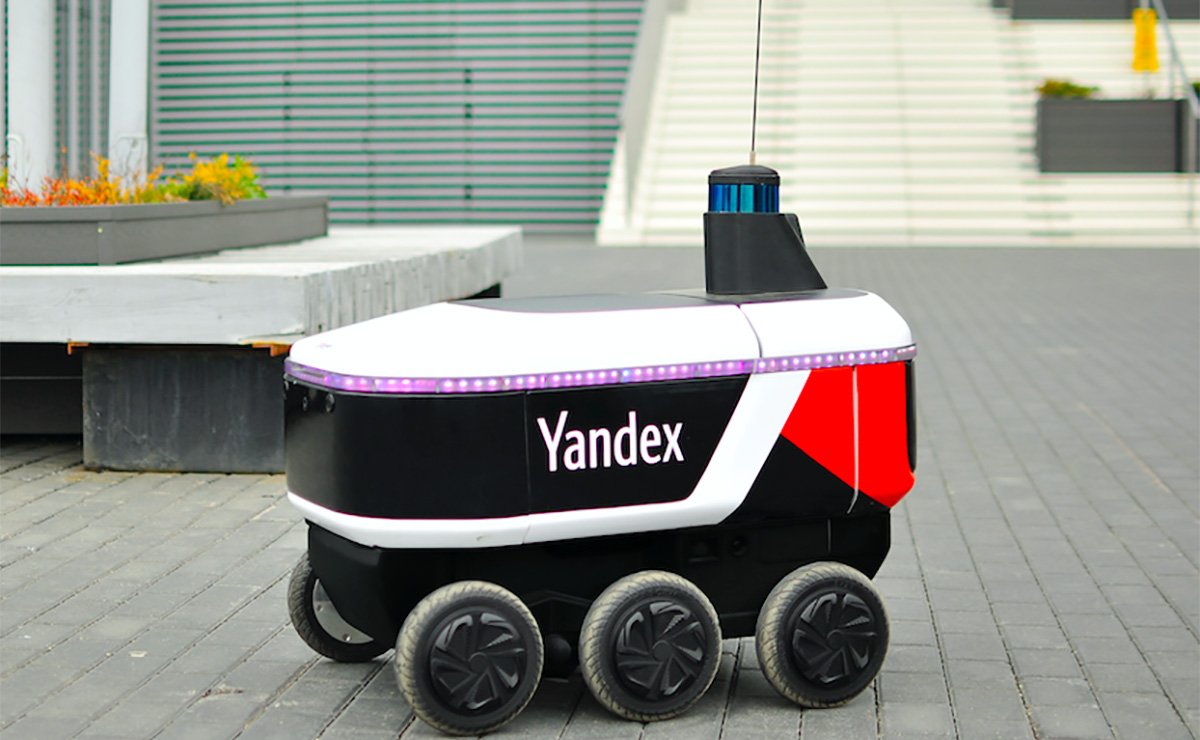| Delivery’s time to shine? |

Coronavirus has wrought significant changes across the transportation landscape. Among them: a renewed focus on using autonomous-driving technology for delivery services.
On April 7, self-driving startup Nuro received a permit to test its driverless delivery vehicles on certain California roads.
Now comes the Yandex Rover.
On Wednesday, Russian tech titan Yandex launched a commercial rollout of its Rover delivery robot. The company deployed the six-wheeled sidewalk vehicle that’s about as big as a cooler, in Skolkovo, a tech-minded suburb of Moscow. It’s the first deployment of the Rover, which began road testing in November, outside the company’s private campuses.
Employees of city offices will be the first to use the app-based delivery service, and the Rovers will travel “several kilometers” between buildings on public sidewalks. Along these trips, the Rover will meet pedestrians, cross streets and encounter other obstacles.
“We designed Yandex Rover to help people automate routine delivery of small packages,” wrote Dmitry Polishchuk, head of Yandex’s self-driving efforts. “In the future, together with the Skolkovo team, we will consider how else our robot can help optimize tasks in the city.”
With consumers sheltering in place and fearful of trips to pick up takeout from their favorite restaurants or excursions to the grocery store, an increasing number of people are using human-based delivery services for the first time.
As these services potentially transition toward autonomous delivery in the years ahead, one aspect to note is the form factor. Neither Nuro nor Yandex use traditional passenger vehicles. In fact, Nuro won the first-ever exemption granted by the U.S. Department of Transportation to launch vehicles that don’t conform to certain federal motor vehicle safety standards.
Nuro’s smaller vehicles are tailored for driving on public roads, whereas Yandex and others are examining the sidewalk as a potential delivery surface. How these new delivery vehicles develop and where they deploy remain intriguing questions without firm answers.
But as COVID-19 is accelerating use of delivery services, now is a great time to start asking them.
— Pete Bigelow
What you need to know
New American Center for Mobility CEO After a five-month search, the American Center for Mobility has named Reuben Sarkar, a former U.S. Department of Energy official, as its new CEO. Sarkar was chief product officer at Colorado startup Forge Nano. He joins the self-driving test facility, in Ypsilanti, Mich., in suburban Detroit, at a time when some widespread autonomous deployments are being delayed and some automakers are questioning their mobility-related projects.
Audi quits bid to give A8 Level 3 autonomy Audi has abandoned plans to introduce its Level 3 autonomous driving technology in its A8 flagship sedan, a senior executive told Automotive News Europe. The feature, called Traffic Jam Pilot, was the most significant technological breakthrough added to the latest-generation A8 that debuted in 2017. At that time, Audi said the system would be activated only in markets where governments allowed it.
Velodyne’s wild ride It’s been an arduous stretch for Velodyne Lidar Inc. Over the past year, it has sold its audio technology business; flirted with and ultimately backpedaled from an initial public offering; won a crucial ruling in one intellectual property lawsuit and filed two more; installed a new CEO; and made two rounds of layoffs — with the second prompting accusations this month that the company violated federal labor laws.
In the latest issue of Shift, we feature PACEpilot honorees, suppliers whose groundbreaking innovations have not yet reached commercialization. We also take the pulse of mobility startups and investors. Click here to read the issue.
Roundup
Ford postpones autonomous vehicle commercial services until 2022.
Lyft to cut 17 percent of work force, reduce salaries.
GM has delayed its Hummer electric vehicle reveal. Meanwhile, Lincoln’s EV project with Rivian has been canceled because of the coronavirus.
Tesla CEO Elon Musk called statewide shelter-in-place orders that have shuttered his Fremont, Calif., factory “fascist.”
The COVID-19 pandemic has added hurdles for mobility startups’ paths.
How to turn “self-learning” into self-driving tech.
Self-driving truck startup Inceptio raises $100 million, report says.
Geely will launch two low-orbit satellites in the second half of the year to provide high-precision positioning services and assist fleet management and new mobility services.
Auto industry outlines proposal for safety spectrum band.
SK Innovation to start construction of second U.S. EV battery plant.
Brain food
There’s room for hydrogen fuel cell vehicles after the COVID-19 crisis is over, writes Automotive News Chief Content Officer Jamie Butters.
Last mile
Electric-truck maker Nikola Motor Co. is facing backlash about receiving funds from the Paycheck Protection Program, CNBC reports.